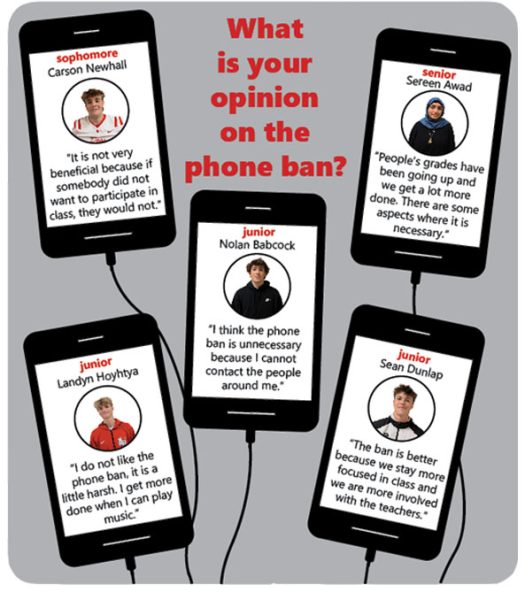
Ashley Johnson

“Around 90% of Americans fall in the category of overusing, misusing or abusing their device,” the Director of the Center for Internet and Technology Addiction Dr. Greenfeld said.
Phones are, undoubtedly, an essential piece of technology in modern-day society. Not only do phones provide individuals with immediate communication, but they also provide entertainment and distraction for the general population. However, as of the 2024-2025 school year, students at Crown Point High School and across the state of Indiana are not allowed access to their phones during class time.
“My initial reaction was ‘finally,’- in a sense of excitement because the phones have been the biggest battle that we’ve had as teachers,” English teacher Mrs. Raloff said. “When most students fail a class it’s typically because they would be on their phones, or they’d prioritize their phones over their classwork.”
Many teachers are ecstatic over the new phone bill, as their students are finally paying full attention to the course work and teachers no longer have to battle technology for students’ attention.
Over the past years, scientists and child psychologists have begun a deep study into the effects of technology on adolescents, not only in the classroom but in life in general.
“The results of this study showed that peripheral blood dopamine levels in adolescents with internet addiction were twice as high compared with those of healthy controls,” The Natural Library of Medicines said, following their studies on the effects of dopamine levels on teens.
These increases in dopamine levels have caused a technology addiction in teens, chemically forcing them to be on their phones and scrolling. The new phone bill in Indiana and staff at Crown Point High School work together to negate the effects of this addiction in the classroom, and hopefully in students’ lives as a whole.
“I think the phone ban has had a positive impact on students,” Principal Marcinek said. “It gives us a reason to step away from technology. People are actually paying attention and listening to things that are important, alongside understanding that there’s a time and a place for a phone. Ultimately I think that it gives people a reason to break away.”
The phone ban has, hopefully, begun to alleviate some of the technology reliance and addiction of the current generation while also assisting students in their academic efforts.
However, some students disagree with the passing of the bill.
“I feel more stressed out and uncomfortable without my phone,” junior Emily Alahmad said.
Many students feel heavily constricted and uncomfortable without access to their phones, feeling as though the school is taking away their freedom.
“I feel like I’m not as focused because we can’t use our Airpods or anything either,” sophomore Ivori Holly-Dwyer said. “I feel like I need my music to concentrate.”
Additionally, students feel as though the new rules are inconsiderate of their different ways of learning. Many students say that they need their background music in order to properly concentrate.
However, it is also important to note the effect phones have had on the communication skills of modern-day students.
“Conversation is the most human thing we do,” author Sherry Turckle said. “It’s where empathy is born, where intimacy is born. We’ve actually moved away from conversation in a way that my research was showing is hurting us. It decreases the empathic connection that people feel toward each other.”
Phones have severely limited people’s communication skills and stunted the current generation significantly. The new phone ban hopes to limit this social effect on teens and help them learn to communicate in person, with the overall goal of saving the future of face-to-face interactions.
“That communication level had just disappeared; kids would be texting each other constantly, sometimes even in the same classroom,” teacher Mr. Gill said. “Now they’re actually talking face to face.”
The new phone ban is accomplishing its goal of fostering student interaction while supporting focus in the classroom as students are encouraged to talk to each other and be exposed to real communication without a screen.
With the ultimate goal of helping student attention spans and increasing communication skills, the new phone ban seems as though it is here to stay. Not only is the phone ban helping to alleviate dopamine addictions, but it’s also assisting in students’ success in the classroom and socially. Through this new school and state-wide phone ban, it truly seems as though administration is helping to fulfill their goal of fostering a community of culture and connection.